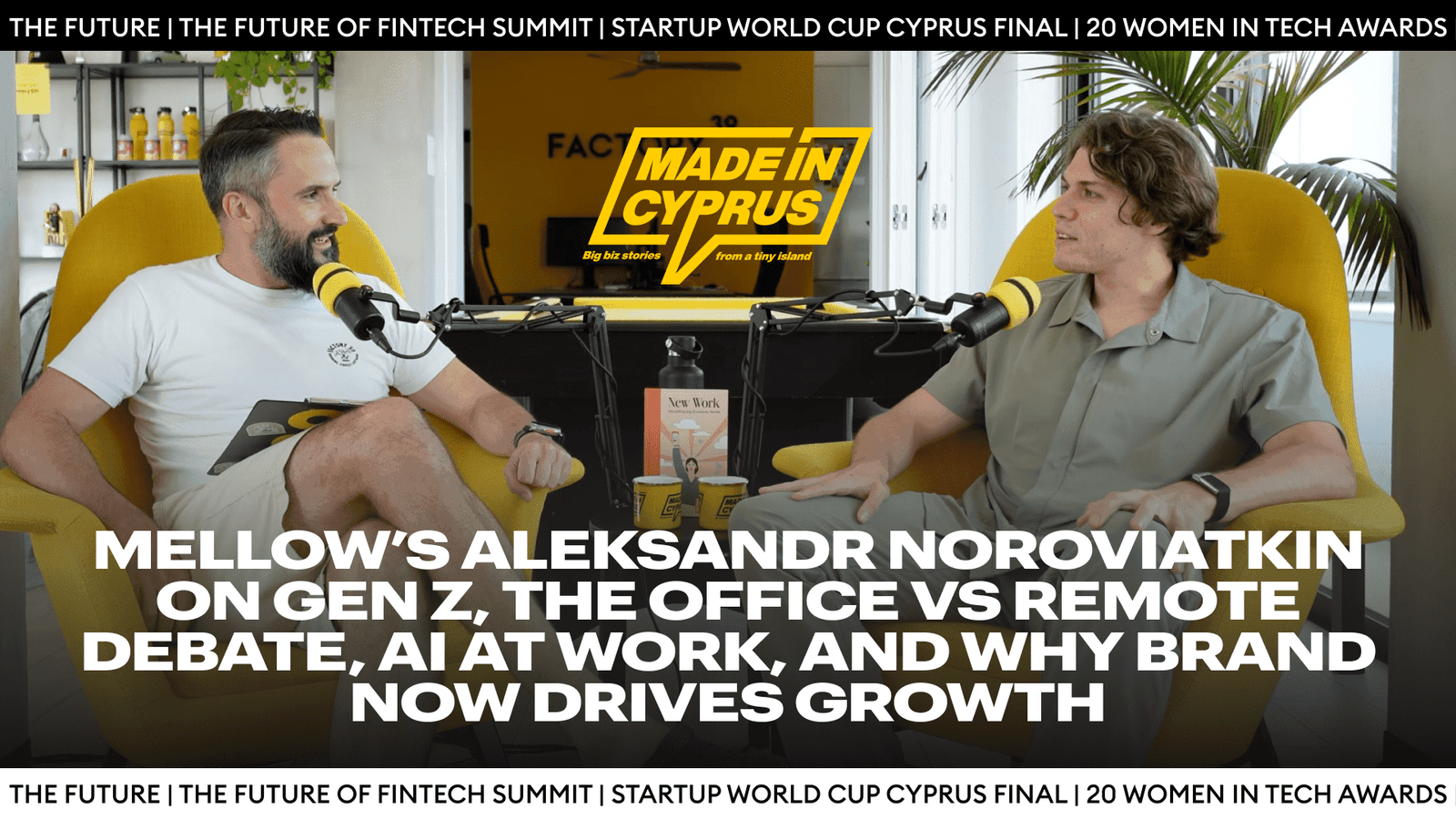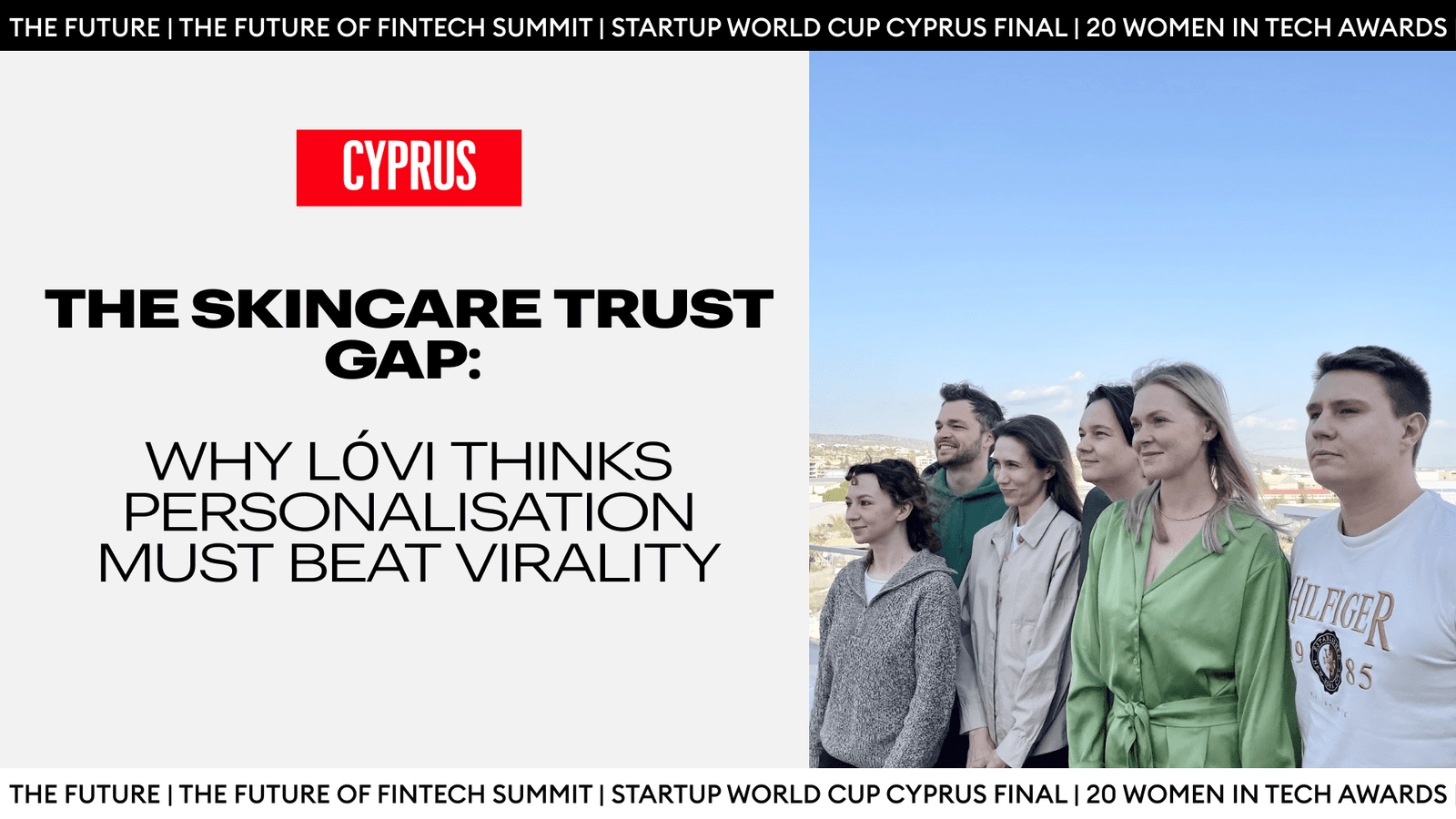Aleksandr Noroviatkin pauses. “The most painful point here is that offices are emotional spaces.” His voice tightens. Another half beat, and he then shakes his head slightly. “Virtual offices lack emotions.” The room stays still for a moment as Martin Zarian, host of Made in Cyprus, lets the point settle.
In the podcast’s 7th October, 2025 episode, Zarian, who is also the co-founder of Factory 39, sits down with Aleksandr Noroviatkin, Head of PR and Brand at Mellow, a platform that streamlines how companies hire, manage, and pay independent contractors with compliant onboarding and global payouts. Their conversation takes a deep dive into the future of work: from how Gen Z is carving out a new work culture, why the office-versus-remote office debate doesn’t have a one-size-fits-all solution, where AI fits into real daily workflow, and how brands can reignite their growth in a saturated market.
Follow THE FUTURE on LinkedIn, Facebook, Instagram, X and Telegram
The Gen Z factor
The first topic of choice is the changing workforce trends. “Today, it’s the organisations that set the rules,” Noroviatkin explains. “They have the power, they have the money, and they have the agency. But what we are seeing from our customer base is that entrepreneurs are also beginning to have this agency to influence organisations and set their own rules.” The best example of a group pushing for elasticity in company culture is the Gen Z workforce.
Noroviatkin muses over the difference between his own generation’s upbringing to that of those only coming into the labour market now. Gen Z, he explains, did not grow up with the office as the end goal. Even in their pop culture, they “see something else,” so “for them contract-based work makes much more sense.” They choose it for “flexibility and freedom” and because they want “agency to do what they want to.”
He adds an example from one of their own clients. The US-based tech company has a mostly Gen Z workforce. The latter have made it clear from the beginning that they prefer to work as contractors rather than full-time employees. They are not interested in the benefits; for them, the control of choosing where to put their money, how and where to live, and how to work is more important than the standard 401(k) schemes.
Noroviatkin’s advice? Treat contracts and flexibility as core choices, not as perks on the job offer page. Prepare your management to understand the new workforce that is coming in, and construct your strategies to be future-forward rather than stuck to present structures.
Office versus remote
This then raises the question about structure: where should work happen, and when?
Though his company promotes remote workspaces, Noroviatkin is not convinced the current environments are developed enough to fully support the employees’ holistic well-being. “Offices are emotional spaces,” he says. “Virtual offices lack emotions.” He ties the point to the daily rhythm. The small cues, the quick read of a room, the sense of safety that comes from seeing people you know. Remote setups struggle to match that. “Discussion is much more valuable and easygoing when it comes to the office culture, not the virtual meetings.”
In an office, you feel connected, valued, and able to anticipate what comes next. The brain relaxes. At home, a short message from an accountant can trigger a spiral of doubt. Remote work brings more uncertainty into the day. That does not make offices the only answer. It means leaders need to be honest about what each mode gives and where it falls short.
So, where does Noroviatkin sit on the office versus remote debate? That all depends on the company’s own culture, and trying to follow a single solution in his experience will not work. Teams do different jobs and need different rhythms. “You don’t want to find an all-in-one solution, because it’s a long shot. You won’t find it, for sure.” For him, there is no silver bullet when it comes to the future of work.
His advice is to approach the question bottom-up. Companies should give teams the reins to experiment and track their results, then check again after about six months. If their current system does not work, they should have the flexibility to change it.
AI at work: building skill, not fear
The conversation then turns to Artificial Intelligence. Aleksandr Noroviatkin is direct. “You should stay resilient,” he says. Use the tools. If you can improve a process “by 10 or 20 percent,” you remain valuable inside most companies.
At Mellow, the team ran a hackathon and asked their employees to build small agents for their own tasks. This was not just for the engineering team. HR took part. Legal and finance did too. Each person picked a real problem from a normal week and tested whether an AI tool could help.
Noroviatkin is also a big advocate for supporting people who show real interest in the space. “We should give them money so they can go learn something new,” he says. In return, all he asks is that they share what they learned so the entire team can level up. The result, he adds, benefits “my team… our company… and the person.”
“AI will move really, really fast,” he says, but there is still “a lot of work to do.” Mellow’s CEO, Pavel Shynkarenko, recently launched an AI gallery in Cyprus to promote the public’s curiosity and creativity.
Brand and positioning
After tools and workflow, Zarian brings the conversation to his favorite topic: branding. “Why should people invest in brands?” he asks. Why invest at all? Noroviatkin does not blink. You can land a big client without it, he says, but enterprises do not buy on the sales process alone. They go for the brand. That is the first point. The brand reflects reliability, vision, and approach. It tells a buyer they can speak to your team without feeling they are breaking something sacred. “Branding is very important when it comes to enterprise, when you want to land those clients.”
The second point is differentiation. When the market feels saturated and your product blends in with the rest, the way the company can make its mark is through careful branding. He gives the example of the water bottle market. There are a lot of brands on the market, even though in some cases, drinking water can be as easy as opening your tap and pouring yourself a glass. But one company has made buying their product almost “sexy,” and that is: Liquid Death. Their marketing campaigns have been so successful that their merch sales are outweighing the actual product. Their branding has allowed them to stand out in the market.
The third thing is the team. “You need to find the star talent that will help you develop your brand,” Noroviatkin says. Without a team supporting the vision and taking it to the next level, the brand will go stale.
However, branding should only come after the company has already established its market and channel fit. Otherwise, the brand strategy will fall apart. “A good product is your ticket to play,” he explains. “But the game brand is how you will ultimately win the game.”
Where the future of work is heading
So, what’s the main takeaway from Noroviatkin and Zarian’s conversation? Stop looking for the perfect system. Even though most of the power and authority over work culture is currently in the hands of companies, Gen Z is rapidly changing that narrative and rules around flexibility and contracts. The office-versus-remote debate has no universal answer. AI should not be feared but seen as an opportunity for experimentation. When products feel like just another tree in the forest, the brand becomes the deciding factor.
What makes this discussion valuable is its refusal to oversimplify. Instead, it acknowledges the complexity of each question and the nuances that come from spaces that are ever-changing, ever-growing. Noroviatkin doesn’t pitch remote work as the future or dismiss offices as antiquated systems. He doesn’t frame AI as either a saviour or a threat to the job market. Instead, his advice is to recognise the value of the human, that is to give teams autonomy to test what fits, invest in people who want to learn, and stop searching for the one-size-fits-all solution.














